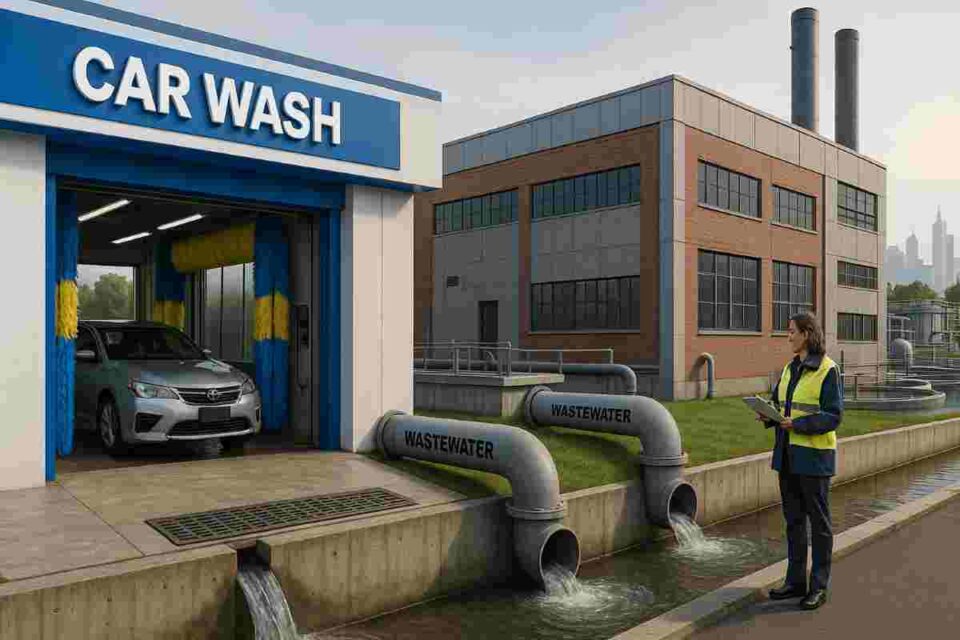Last Updated on July 24, 2025 by Admin
Have you ever wondered where the dirty water from a car wash goes? Or the byproducts being flushed down by a cheese factory?
ConstructionCareerHub App is LIVE — built ONLY for construction careers. Don’t apply with a weak resume.
Get ATS-ready Resume Lab + Interview Copilot + Campus Placement Prep (resume screening, skill gaps, interview readiness) — in minutes & Other advanced features.
Explore Smarter Construction Career Tools →Quick check. Big impact. Start now.
In an ideal world, it would harmlessly disappear down the drain, but unfortunately, that is not the case. Furthermore, these substances can raise a serious issue for the environment.
That is where trade effluent consent steps in.
Let’s firstly establish what trade effluent consent is, who requires it, and why it is so pivotal.
Table of Contents
What is Trade Effluent?
Simply put, trade effluent is any liquid waste (which is not domestic sewage; water that is used in washing hands or toilets) that is released by a company into the sewer system.
It can comprise oils, detergents, and chemicals, as well as food residues and even small metal particles.
You may be surprised to know how many types of businesses produce trade effluent. It isn’t just big factories; small operators, such as car wash stations or local breweries, can also fall into this category.
To learn more, visit Castle Water’s guide on trade effluent.
Why Does Trade Effluent Consent Matter?
Wondering why you should have a trade effluent consent? Well, if untreated wastewater is released into a sewer, it can:
- Damage public sewer infrastructure
- Interfere with the treatment of wastewater processes
- Cause damage to local water ecosystems if effluents reach rivers or streams
This is why trade effluent consent is required by water authorities. It is a legal agreement between businesses and their local sewage companies that stipulates what types of effluent can be discharged, and what the suitable scenarios for this are.
The purpose of this is not to impose rules and red tape; it is to safeguard the environment and public health.
Who Needs Trade Effluent Consent?
Any business that is exposed to harmful liquid wastes (trade effluent) requires a trade effluent consent.
Not sure if you fall under the bracket? Here are some standard examples of businesses that would require it:
1. Car Washes
They are the classic contaminants of trade effluent. Runoff water from car washing is often contaminated with oil, detergents, brake dust, and other pollutants. Even small hand-wash setups require consent if their effluents are connected to the sewer.
2. Food and Beverage Businesses
These include dairies, cheese factories, breweries, and meat processors. Fats, oils, grease, and biological matter produce a high amount of waste that can cripple water treatment systems.
3. Factories and Industrial Plants
Ranging from metal finishers to electronics makers, these industries discharge wastes that are contaminated with heavy metals, solvents, or chemical residues. Therefore, they require strict monitoring and should be treated before discharge comes into public systems.
4. Commercial Laundries and Dry Cleaners
The effluent here involves more than soap and water. It can include solvents, dyes, and detergents, which are toxic in high concentrations.
5. Laboratories and Research Facilities
Especially those handling chemical, pharmaceutical, or biological materials. They have hard waste containing compounds that require specific treatment and permission.
6. Places that Might Surprise You
Fish markets, hospitals, and commercial kitchens might need consent if there are extremely high levels of grease or cleaning agents in their wastewaters.
What If You Have No Consent?
Dodging trade effluent consent is not only risky—it’s unlawful. Without it, a business may be subjected to:
- Heavy penalties or even criminal charges
- Impairment of the local water system
- Business operation suspension
- Future reputational loss with customers and regulators
The environmental cost is also huge. Even minor pollutants can accumulate, which can hinder aquatic life and pollute drinking water sources.
How Can I Get Trade Effluent Consent?
Getting trade effluent consent is practical, simple, and straightforward. Here’s all you need to do:
- Assess Your Wastewater
Know what your business is discharging. Determine the type, volume, and frequency.
- Contact Your Water Authority
Notify the sewage company in your regional area. They will provide guidance on the forms and requirements.
- Submit an Application
Usually, this application contains technical data on how the applicant plans to manage and monitor their waste.
- Install Monitoring Systems (if required)
You may also need to set up ways to partially or fully address the treatment of effluents or self-monitoring.
- Stay Compliant
Regular check-ins and reviews are necessary. Renewal dates should never be ignored, nor should changes in operations affect wastewater discharge.
Wastewater Is a Key Responsibility
Whatever form it takes, from small car washes to massive manufacturing plants, if you run a business that produces non-domestic wastewaters, trade effluent consent is not just a check-list item, but an essential component of sustainable, healthy, and legal working.
Indulging in a culture of awareness and obtaining consent goes beyond the avoidance of fines. It builds an image of your company as being environmentally responsible, ready for the future, and willing to do the right thing.
If your drains are escalating wastewater discharge, then it should make you think: ‘Do I need a trade effluent consent?’ In most cases, the answer will be ‘Yes’.
Related Posts:
- When Can a Contract Be Broken?
- How Do I Keep The Washing Machine Smelling Great?
- Impact of Lightning on Building and Remedial Measures
- Exploring the Various Types of Construction Jobs: Your Ultimate Guide to Building a Career in Construction


